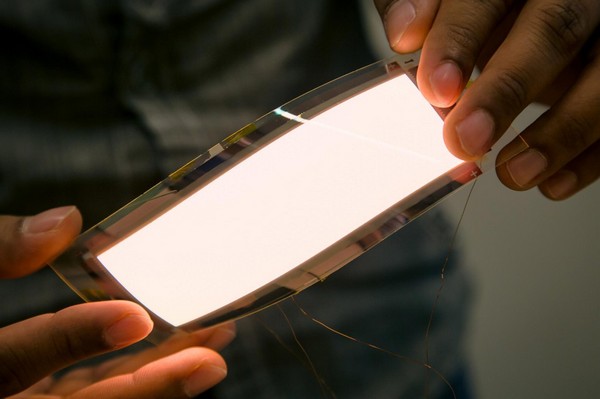Europe’s technology leaders in the development of flexible OLEDs for lighting and signage applications have joined together in a consortium to develop an open access pilot line that will accelerate the commercial adoption of this promising new technology.
The project titled ‘PI-SCALE’ aims to create a European-wide pilot line which will enable companies of all sizes to quickly and cost effectively test and scale up their flexible OLED lighting concepts and turn them into market ready products. The project is supported by the European Commission through the Photonics Public Private Partnership with a contribution of EUR 14 million (US $15.21 million).
 |
|
PI-Scale will be able to help accelerate the commercialization of OLED panels and lighting products such as those seen in this picture. (Photo Courtesy of Pi-Scale) |
Flexible OLEDs have the potential to be integrated into formed parts or seamlessly bonded onto curved surfaces, and the commercialization of this technology will open up a host of exciting design opportunities to create new value adding lighting products in many different application areas, such as architecture, automotive, aerospace and consumer electronics. The technology allows for ultra-thin (<0.2 mm), highly bendable, very lightweight, and even transparent, energy efficient lighting solutions that can be made or cut to any shape or size.
PI-SCALE will offer world class capability and services in the pilot production of customized flexible OLEDs and initially focuses on product streams in the areas of automotive, designer luminaires and aeronautics applications. Coordinated by the Holst Centre, PI-SCALE brings together fourteen expert partners from five European countries and includes the Audi AG, CPI, VTT, Fraunhofer, M-Solv, FlexEnable, DuPont Teijin Films, Brabant Development Agency (BOM), REHAU, Emdedesign, Pilkington, Coatema Coating Machinery and AMIRES.
PI-SCALE will allow companies unique access to test and develop their specific applications at an industrial scale and thus achieve the product performance, cost, yield, efficiency and safety requirements that facilitate mass market adoption. The consortium will combine and utilize existing capability from each of the partners to create a self-standing, open access European flexible OLED pilot line. The pilot line will be available during and after the lifetime of the project to companies on an open access basis, and the specialist infrastructure will include all the steps required to turn OLED lighting concepts into manufactured products.
Dr. Ansgar Niehoff, Researcher at REHAU AG+Co, Department of Advanced Materials, who are one of the end users in the project says:
“PI-SCALE gives REHAU the opportunity to gain in-depth knowledge of flexible OLED production with the top European players in this field. This will help us to integrate flexible OLEDs into our premium polymer products in the best possible way.”
Dr. Joanne Wilson from the Holst Centre, who are coordinating the project adds:
“The creation of this pilot line is a fantastic opportunity for a wide range of companies to get flexible OLED technology out of the research and development phase and into products.”
PI-SCALE is one of three major pilot lines which have been launched by the European Photonics Public Private Partnership (PPP) to help companies to take photonics technologies from the lab into commercial markets. The pilot lines will mean that thousands of high tech companies, who often lack access to advanced, cost-intensive infrastructures and expertise, will be able to take their good ideas, scale-them up and validate them into innovative products for commercial manufacture. The two other pilot lines ‘MIRPHAB’ and ‘PIX4Life’ will focus on photonics technologies for health applications and sensors for the detection of chemicals in gas and liquids. The European Commission has invested €35 million in these projects to boost Europe’s industrial competitiveness. This is part of the Commission’s EUR 700 million investment in the Photonics Public Private Partnership over the seven years of Horizon 2020, the Framework Program for Research and Innovation.












